Masters of traditional arts carry old values into a new era
By Psyche Cho Launched by the Taipei City Government, the award is aimed at paying homage to highly-accomplished masters, with the hope of stimulating the general public’s concern over the preservation of traditional arts, said Deputy Taipei Mayor Chiu Wen-hsiang during the ceremony. The masters honored include Lin Chin-nien, a puppet performer who inherited the Taoism Zhong Kui Ritual; Chen Chin-lai and his rustling drum parade group; Hsieh Kin-kan, a tireless pursuer of the art of kite-making; Liu Chia-chen, who preserves the art of traditional door god painting; and Kung Le Hsuan, a hundred-year-old Beiguan musical club. The Drum Parade Group—Chen Chin-lai Just a few decades ago, these art forms now labeled as tradition were an integral part of people’s daily lives in Taiwan. When migrants first settled down on the island, religious belief was one of their major sources of moral support. A rustling band is an essential part in heating up the pace in religious festivals. Most of the time it is a percussion and wind ensemble (鼓吹陣頭) that plays such a role. The basic ensemble consists of three people marching and playing the suona horn, a few big drums and some gongs on occasions like marriages, religious rituals and even funeral processions. Da Tou Drum Tower (大頭金來鼓亭) led by Chen Chin-lai is a pioneer in revising the format as well as style of such groups. Inspired by the bell and drum tower found in temples, Chen’s father designed a drum tower similar in shape. The delicate, carved wooden tower is portable and compact so that it can easily be transported around the countryside. “Traditional arts should be well-preserved and shall never disappear in our generation,” urged Chen during his speech as part of the ceremony. Kung Le Hsuan—Beiguan Musical Club Pious belief in gods inspires grand celebrations around the island of Taiwan each year. Many local musical clubs have been organized to perform on the occasion of the birthdays of these deities. In Taipei, Kung Le Hsuan (共樂軒) is a typical group. Based in Dadaocheng, the club was established during the Qing Dynasty. It has gradually assumed leadership among the numerous parade groups formed in Taiwan since the 1950s. “Beiguan music is the traditional ‘heavy metal’ music in Taiwan,” joked host Lin Mao-hsien, a specialist in folk culture, referring to the gongs and drums used in these performances. Zhong Kui Ritual—Lin Chin-nien “I learned how to manipulate Taiwanese traditional hand puppets from my father at the age of 15,” said Lin Chin-nien. Lin’s talents were recognized by the late hand puppet maestro Li Tian-lu. He was named the main player in the Si Wan Ran puppet troupe, a position he held for many years. His skill in operating hand puppets enabled Lin to learn the operation of the string-controlled Zhong Kui puppets. The Zhong Kui ritual (跳鍾馗) is a Taoist ceremony performed in its entirety on the founding of new temples, companies, and other events to ward off ghosts and give blessings. Receiving the award from deputy mayor Chiu, Lin urged the government to preserve this art that faces the fate of disappearing because, as he notes, “it is not only the culture of Taiwan but also the history of Taiwan.” Door Gods Paintings—Liu Chia-chen At the moment when worshipers enter into a temple, they first have to pass under the eyes of two deities standing guard at the temple door. This type of painting for religious purpose originally has been turned into an art form under the brush of Liu Chia-chen. Liu outshone his peers by merging symbolic meaning with advanced painting skills to create an effect which is both realistic and solemn. “Lifelike representation is the ultimate principle here,” said Liu. To achieve such effects which are lacking in traditional ink painting, Liu has also dabbled in other types of painting. He employs western painting techniques to better portray the expression of the eyes, and he integrates calligraphy to display the waves of strokes. “We should take better advantage of the numerous temples in Taiwan and turn them into shrines of art,” noted Liu. Considering these door god painting a kind of religious art, Liu recommended in his comments during the ceremony that every household should have a door god painting. “In addition to be a protective guard, the door god painting can also be deemed a form of art and worth preservation,” said Liu. “The Old Naughty Boy of Kites”—Hsieh Kin-kan Born in 1926, Hsieh Kin-kan is the eldest in this year’s group of awardees. Great interest and passion have been the motives that drive him further on the path of innovation. Devoted to the art of kite in his 20s, Hsieh is still enthusiastic about promoting the culture of kites. “I believe that everyone loves flying kites,” saidHsieh, who is a perfectionist in the eyes of his daughter. Hsieh said flying kites is an outdoor activity, which is good for the health of children nowadays. He added that designing a kite requires exercising the brain, and that makes it a leisure activity worth further promotion. “Cultural development takes root in traditions,” said Hsieh Hsiao-yun, Commissioner of the Taipei City Department of Cultural Affairs, in the awards ceremony. She added that she hopes the award will make the younger generation value the traditional arts and the heritage they represent. A special exhibition covering the cherished documents and creations of these awardees is now on display in the Dadaocheng Theater, running until August 28.
Staff Reporter
photo courtesy of Taipei City Department of Cultural Affairs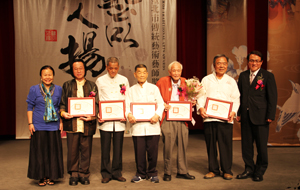 Their lifelong dedication to what they believe is dearest to this land has finally paid off as four masters and one traditional music club received the Taipei Master of Traditional Arts Award May 7 in Taipei.
Their lifelong dedication to what they believe is dearest to this land has finally paid off as four masters and one traditional music club received the Taipei Master of Traditional Arts Award May 7 in Taipei.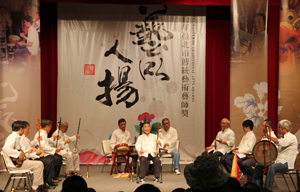 “It feels like the clock is reversing and I’m returning to my childhood,” said Chiu as Taipei Kung Le Hsuan opened the awards ceremony with a lively performance.
“It feels like the clock is reversing and I’m returning to my childhood,” said Chiu as Taipei Kung Le Hsuan opened the awards ceremony with a lively performance.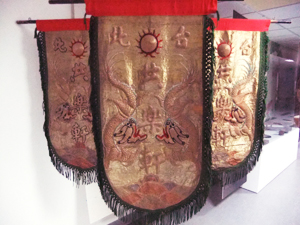 Thus resounding Beiguan music has become the theme music for most parade groups. Noted primarily for its lively and bold musical style, Kung Le Hsuan has been awarded 21 silver flags in Tainan. The group’s veteran performers are now in their 70s and 80s but are still actively involved in local folk and cultural events.
Thus resounding Beiguan music has become the theme music for most parade groups. Noted primarily for its lively and bold musical style, Kung Le Hsuan has been awarded 21 silver flags in Tainan. The group’s veteran performers are now in their 70s and 80s but are still actively involved in local folk and cultural events.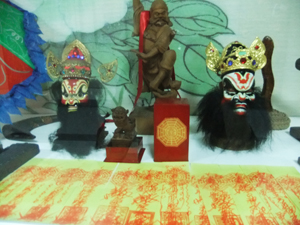 In the early days when schooling was not compulsory or widespread in Taiwan, those who could not afford an education usually started their career by following a mentor in some trade. That is precisely how traditional arts have been passed down to later generations.
In the early days when schooling was not compulsory or widespread in Taiwan, those who could not afford an education usually started their career by following a mentor in some trade. That is precisely how traditional arts have been passed down to later generations.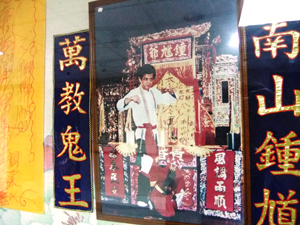 People tend to consider the ceremony a taboo as it relates to evil spirits. Lin, however, encourages people to appreciate the ritual as a traditional art.
People tend to consider the ceremony a taboo as it relates to evil spirits. Lin, however, encourages people to appreciate the ritual as a traditional art.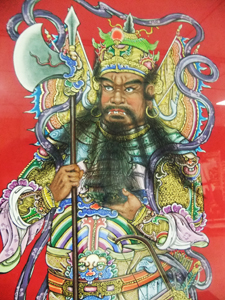 Born in 1955 in Nantou County, Liu started painting early as a junior high school student. In 1980, Liu went north to Taipei and had his first work debut in a temple in Muzha. He later participated in several heritage conservation projects.
Born in 1955 in Nantou County, Liu started painting early as a junior high school student. In 1980, Liu went north to Taipei and had his first work debut in a temple in Muzha. He later participated in several heritage conservation projects.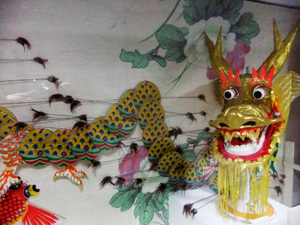 Flying kites may be one of the common childhood memories shared by many people. But Hsieh Kin-kan refused to let it be just fun for children, turning it into a full-fledged form of art.
Flying kites may be one of the common childhood memories shared by many people. But Hsieh Kin-kan refused to let it be just fun for children, turning it into a full-fledged form of art.

![Taiwan.gov.tw [ open a new window]](/images/egov.png)
